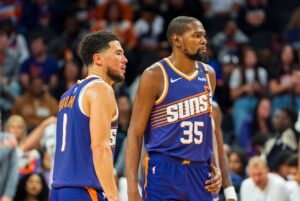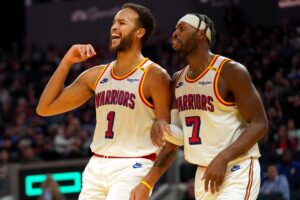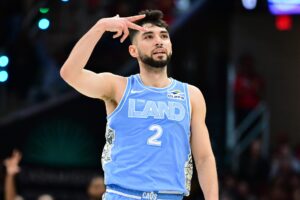As the NBA off-season rolls along, speculation grows. It’s the off-season and pundits need to speak and write. There is speculation on league rules, there’s chatter about prospective player moves in the following free agency period. Even team strategy is not off-limits. To this end, one of the topics discussed is “Tanking”. NBA teams tanking is arguably the most polarizing subject in North American sports. This article seeks to highlight a few factors for and against the concept of NBA teams tanking.
The NBA Tanking Argument
There’s a reason why only North American professional sports leagues have the “tank” scourge affliction. The draft is that reason. In Europe, Australia, Asia, and Africa where professional sports are played, tanking a season is non-existent. This is because there is NO draft in those leagues. Though the USA prides itself on the notion of capitalism, someone thought it best to make its sport a socialist experiment. Buzzwords like parity, small-markets, and economic inequality are bandied about to sell this absurd, restrictive concept. In the NBA specifically, the draft lottery is sold as the plaster for the sore of mediocrity and incompetence.
While this may be so for franchises like the Cleveland Cavaliers (who won the lottery and drafted superstars LeBron James, and Kyrie Irving), the San Antonio Spurs (Tim Duncan), the Miami Heat (Dwyane Wade) and the Oklahoma City Thunder (who drafted three eventual league MVPs), has been terrible for many also. Teams like the Sacramento Kings, Phoenix Suns, Orlando Magic, and the Memphis Grizzlies are proof positive that the draft cannot fix stupidity.
The NBA draft lottery is an event however with teams and their fans holding out hope of winning that first overall pick. Many teams have tried and failed at tanking only to acquire “lemons”. The Boston Celtics come to mind. Under then coach and President of Basketball Operations Rick Pitino, the 1996-97 Celtics tried successfully to bottom out. While they had the best odds of winning the lottery, the Celtics were award with the third selection in the draft. The Spurs won that lottery and Tim Duncan and the Celtics drafted Chauncey Billups. Billups was never made comfortable and eventually shipped off. Eventually, Billups became a 3 time All-NBA player, perennial All-Star and NBA Champion. Not too bad.
Stories like those litter the NBA, but in hope of drafting the next great player teams tank. Kawhi Leonard and Giannis Antetokounmpo were drafted fifteenth, while Stephen Curry seventh. Even Manu Ginobili was selected 57th. As long as there is an incentive structure to reward bad play, teams tanking continue.
Small Market Inequalities
A reason many teams are excused for “Tanking” is they play in a small market. The market spoken of is “Media Market”. Simply put, the number of televisions determines the market size. Therefore the largest cities are the large markets, where the smaller cities are the small markets. Small market NBA cities include San Antonio, Oklahoma City, New Orleans, Memphis, Indiana, Utah, Portland, Orlando, and Milwaukee. It’s been long believed that stars are reluctant to play there long-term due to the market size. After all large companies would spend their advertising dollars where they get the biggest bang for their buck.
That might be true, except Paul George (then of the Indiana Pacers and now) a member of the Oklahoma City Thunder had a national marketing campaign centering around him while he was in Indiana. Same with Russell Westbrook of the Thunder. In this age of social media, players don’t need to be physically in New York or Los Angeles to reach their audience. Through their insatiable need to be in the limelight or the phobia of being irrelevant, players have engineered their ways out of “smaller markets” previously. Vince Carter (formerly of the Toronto Raptors) comes to mind.
Championship or Bust
Is there anything more sports-take or gas-bag like than the notion of “championship or bust”? Think about it for a moment. The concept is myopic at best. With the exception of the Golden State Warriors whose roster consist of four all-stars and five of the top 30 players in the league, championship or bust is a futile, misguided thought-process.
In Major League Baseball this practice of tanking is common and was even endorsed by the commissioner Rob Manfred in an interview. Manfred cited the Houston Astros as his example. He said they practiced a ‘tried and true’ method. However, the NBA is much different. The Memphis Grizzlies were never genuine championship contenders. However, no one can say those teams that played tough in the playoffs for the last few years were failures.
Former Sixers general manager Sam Hinkie’s “Process” was based on the mindset of the championship chase. When asked about incremental improvement, Hinkie was resolute. Hinkie said, “What we look at is, how do we add to what we’re doing in a way that gets us closer to our goal? We don’t think that it will necessarily be linear — that every year you will add five wins and after 10 years you will get to 50. That’s not the way we think about the world.”
The Decline of the Front Office Architect
A major reason why teams tank is because of defacto slothfulness. Case in point, just look at the Kings and Suns. It is easier to simply lose and play the lottery than invest time and money in doing due diligence. The top NBA teams all have one thing in common, top-ranked front-offices. Unstable franchises are traditionally those teams that embark in yearly “tankathons”. Teams like the aforementioned Kings, Suns, Orlando Magic and until recently the Los Angeles Lakers all embraced the concept of losing to get better. All of those teams front offices were in shambles.
The Miami Heat found players like Hassan Whiteside, Josh Richardson, Tyler Johnson, Okaro White, Rodney McGruder, and Udonis Haslem. Of course, the Heat front office is led by Pat Riley. Though the Heat isn’t championship contenders, there are zero talks of tanking there. Head Coach Erik Spoelstra considers it an opportunity to learn and grow. “If you know anything about our organization we’re not going to play for any other purpose or motivation than to win. Everything we’re building is trying to build habits to learn how to win but learning how oftentimes comes with frustration, anger, disappointment.” Spoelstra said.
The Upcoming Raptors Rapture
Toronto is another prime example. While this was not an overt tank job, questions must surely arise. The Toronto Raptors led by General Manager Masai Ujiri and Head Coach Dwane Casey had its greatest regular season in 2018. They won 60 games and entered the Eastern Conference playoffs with the number 1 seed. After defeat to the eventual Eastern Conference champion Cleveland Cavaliers, Ujiri promptly fired coach Casey.
Further to that Ujiri in an even more astounding move traded away star guard DeMar DeRozan for Kawhi Leonard. Leonard played nine games in 2017-18 due to a mystery thigh injury and had shown a level of malcontent in San Antonio.
During the press-conference explaining the DeRozan trade, Ujiri said, “You can’t continue doing the same thing over and over again.” Interesting. The Raptors fired its award-winning coach and hired a first-time NBA Head Coach (Nick Nurse). Then they traded away their All-NBA star (who has been improving the last few years) for a player that appeared in 9 games last season. No one knows for certain if Leonard is fully healthy. Funny thing, no one seems to care. That’s crazy. Keep in mind, the combination of Ujiri, Casey, and DeRozan transformed the Raptors from after-thoughts into legitimate contenders. Unfortunately, the Raptors played in the same conference as LeBron James. As a result, James often was the stop sign to the Raptors championship ambitions. However, James now plays in the Western Conference. Ujiri is out of excuses now.
Is Tanking Worth It?
There are many factors that go into a team consciously to lose instead of win. Many of them are based on false narratives and impatience. Team owners make foolish promises to their fans. New GMs make promises to the owners and thus begin the slide into deep mediocrity. As the saying goes, lies beget more lies.
Main Image:






